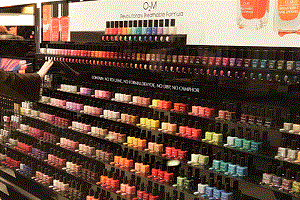POLAND: For Zaida Saleh, like for many observant Muslim women, manicures have long posed a religious problem.
With prayers five times a day, and the pre-prayer ritual of “wudhu” that requires washing the hands and arms, traditional fingernail polish has been mostly off limits because it prevents water from making contact with the nails.
A new ”breathable” nail polish by a Polish company, Inglot, is changing that.
The company and some Muslims say the polish is the first of its kind because it lets air and moisture pass through to the nail. A craze has built up around it with Muslim women in recent months after an Islamic scholar in the United States tested its permeability and published an article saying that, in his view, it complies with Muslim law.
”It’s huge,” said Saleh, a 35-year-old who hadn’t polished her nails in many years but immediately went out and bought the product in five colours, including a bright pink, a burgundy and a mauve. ”I am excited. I feel more feminine – and I just love it.”
The news of Inglot’s breathable polish has in recent months spread quickly from woman to woman and over the Internet. It also has given Inglot a boost in sales of the product, called O2M, for oxygen and moisture.
The nail polish now stands as one of the final life achievements of Wojciech Inglot, a Polish chemist and entrepreneur who developed it to create what he billed as a healthier alternative to traditional nail enamels, which block the passage of moisture and oxygen to the nail. He died suddenly on Saturday at the age of 57 after suffering internal hemorrhaging.
Though the Holy Quran, does not specifically address the issue of nail polish, some Islamic scholars have said that water must touch the surface of the nail for the washing ritual to be done correctly.
Nobody was more surprised by the splash it made with Muslims than Inglot himself.
”I didn’t think there is a single Muslim living here,” Inglot said in an interview nine days before his death at his factory in Przemysl, near the border with Ukraine. ”We didn’t even think about this.”
Inglot said the enthusiastic Muslim reaction to the product began after an Islamic scholar, Mustafa Umar, published an article on his blog in November declaring it permissible. The result was a ”serious increase in the sale” of O2M.
Inglot said the company was unable to immediately meet all requests for orders, but that the phenomenon was so fresh that he didn’t yet have any figures on sales. ”But it looks very promising,” Inglot said. ”We were very surprised and very happy with that.”
Umar, director of education and outreach with the Islamic Institute of Orange County in California, said he decided to study the matter because Muslim women had already been discussing the product in online forums. There was uncertainty over whether it would be ritually compliant, and they weren’t getting any answers.
”So I decided to go ahead and write an article on this because I know how important it is for Muslim women around the world,” Umar said.
He said he has gotten an enthusiastic reception to his opinion from women — not only because they are revelling in the chance to accessorize with colourful varnishes.
“Usually when men give a religious ruling or verdict, they tell women that something is not allowed,” Umar, 31, said. “They felt so good that someone was finally telling them ‘you are allowed to do this.’”
There are still some outstanding questions, however, about how breathable the nail polish will be if multiple coats are used — say a clear bottom coat, two layers of color plus a top coat, as is common.
Before his death, Inglot was working to answer this question and gather other data on the product. The company’s other managers are deep in mourning over losing Inglot but plan to continue that effort. Inglot had insisted on having more data before he felt he could responsibly promote the varnish as being compliant with Islamic law.
(AP)










